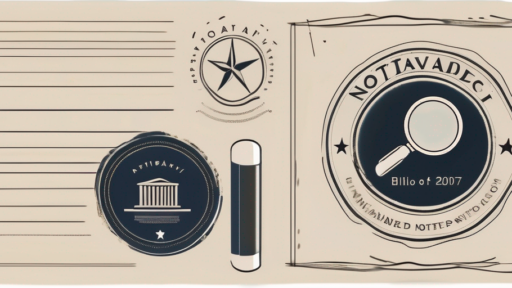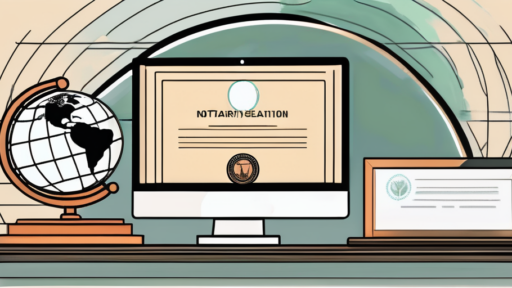Real estate transactions are indeed complicated as they encompass various legal issues, papers, and important steps. It is vital for all involved parties to validate the truth and genuineness of their property matters. This becomes more critical if title and escrow-related services are part of the transaction. A notary for real estate closings is especially important in these cases.
It will be better for the article to concentrate on how notarization can bring the certainty of real estate transactions, i.e., clarity, security, and efficiency to the complex world of property dealings.
Key Takeaways
Notarization Enhances Security: By ascertaining the personal identity of the signatories and verifying the accuracy of the documents, notarization becomes a second security layer of real estate transactions.
Legal Validity and Authentication: Notarized documents are valid and binding, and thus, all parties are protected in the real estate process.
BlueNotary: Online notarization services such as BlueNotary incorporate notarization benefits into the digital environment, making the entire process easier and user-friendly.
Notary for Real Estate Closings: eClosing
Securing Real Estate Transactions with Notarization
A notary public is a person who is authorized by the state to certify documents. It is the notary’s main responsibility to check the identities of the individuals signing the documents and to acknowledge that they are the signatories, willing and aware of the acts carried out.
Why Notarization Matters in Property Transactions
Authentication: Notarization ensures that the signatures on real estate documents are authentic, adding a level of authentication crucial in property dealings.
Preventing Fraud: The notary’s verification process helps prevent fraud by identifying the identity of the signatories, thus reducing the risk of unauthorized transactions.
Legal Validity: Having notarized documents entails legal validity that provides a clear trail of accountability in case of disputes or legal challenges.
The Role of Notary in Real Estate Contracts
Real estate transactions consist of many contracts and agreements. Here are the ones that having them notarized can greatly prevent potential problems.
Common Real Estate Documents That Require Notarization
Document Purpose
- Deed of Trust Secures a loan for the purchase of real estate.
- Power of Attorney Grants authority to act on behalf of another party.
- Affidavit of Title Confirms the seller’s legal right to transfer ownership.
- Promissory Note Details the terms of a loan, including repayment.
Online Notarization with BlueNotary
As there is a rapid development of technology, the traditional notarization process is slowly changing to meet the needs of the digital life we are living in. BlueNotary is one of the many remote online notarization platforms that allow notarization from your home or office.
Advantages of Online Notarization
1. Convenience: Online users have the possibility to carry out the notarization process on the internet without the physical presence.
2. Time Efficiency: Online notarization saves a lot of time that was previously required for the process to be finished executable and convenient for completing transactions within the necessary time frame.
3. Document Security: BlueNotary employs safe encryption to keep the notarized documents confidential and the document’s integrity intact.
Frequently Asked Questions
Q: Can I use any notary for real estate transactions?
A: Of course, no barrier has been put in the way of other notaries to notarize your documents. On the contrary, it is necessary.
Q: Is online notarization legally valid?
A: Generally speaking, the practice of online notarization has been accepted as legally valid, not only in the states that have been mentioned before but in many other states as well. BlueNotary complies strictly with these laws. The laws are designed to protect notaries and the public from fraud.
Q: How does BlueNotary verify identities online?
A: BlueNotary uses multi-layer ID verification solutions, including fraud awareness checking and government-published data of individuals’ attributes (e.g., names, addresses, etc.) that only the individual knows and, as given by identification credentials, to establish the good shipping of the other party.
Q: Are notarized documents tamper-proof?
A: It is true that notarized documents are safe from damage and unauthorized interference because they bear the notary’s signature and stamp, and so offer double security in the process of identification of identity and the prevention of fraud.
Q: What if I have technical issues during the online notarization process?
A: If, in the course of the online notarization process, there is an interruption of the planned activities because of technical problems faced by the users, BlueNotary has provided the customer with supporting services so that he can come out of the crisis in a relaxed manner.
Conclusion
In this first part, we have examined the role performed by the notary in the field of real estate transactions, and we have also highlighted the security, originality, and legal power of the same. We have also investigated the ease that online notarization brings with platforms like BlueNotary. Watch for subsequent parts that are set to take the discussion on notarization to a deeper level, go into the effect it has on the real estate landscape, and much more.
General Queries regarding Real Estate Transactions
What are the specific steps involved in notarizing a document during a real estate transaction?
Validate identity, make sure of comprehension, let the signing be witnessed, and put a seal for the validation of the document.
How does online notarization differ from in-person notarization in terms of legal challenges or disputes?
Online notarization allows for the availability of highly informative digital records for all the processes; thus, the resolution of disputes is made quickly.
Are there extra costs with online notarization services like BlueNotary?
They don’t cost more than the traditional notarization, given that the technology and convenience are the advantages of this method.
What if a signatory lacks technology for online notarization?
Such individuals can use public computers or visit designated service centers for access to required technology.
Can non-residents use BlueNotary for real estate transactions in another state?
Yes, that would be quite possible, provided that a notary observes the laws of the state where the assets are placed.








